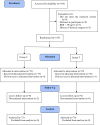Assessing the clinical advantage of opioid-reduced anesthesia in thoracoscopic sympathectomy: a prospective randomized controlled trial
- PMID: 39266989
- PMCID: PMC11391728
- DOI: 10.1186/s12871-024-02711-6
Assessing the clinical advantage of opioid-reduced anesthesia in thoracoscopic sympathectomy: a prospective randomized controlled trial
Abstract
Background: Opioid-reduced multimodal analgesia has been used clinically for many years to decrease the perioperative complications associated with opioid drugs. We aimed to assess the clinical effects of opioid-reduced anesthesia during thoracoscopic sympathectomy.
Methods: Surgical patients (n = 151) with palmar hyperhidrosis were randomly divided into control (Group C, 73 patients) and test (Group T, 78 patients) groups. All patients were administered general anesthesia using a laryngeal mask. In Group C, patients received propofol, fentanyl, and cisatracurium for anesthesia induction, and maintenance was achieved with propofol and remifentanil, along with mechanical ventilation during the operation. In Group T, anesthesia was induced with propofol, dezocine, and dexmedetomidine (DEX) and maintained with propofol, DEX, and an intercostal nerve block, along with spontaneous breathing throughout the operation. Perioperative complications related to opioid use include hypotension, bradycardia, hypertension, tachycardia, hypoxemia, nausea, vomiting, urine retention, itching, and dizziness were observed. To assess the impact of these complications, we recorded and compared vital signs, blood gas indices, visual analogue scale (VAS) scores, adverse events, and patient satisfaction between the two groups.
Results: Perioperative complications related to opioid use were similar between groups. There were no significant differences in the type of perioperative sedation, analgesia index, respiratory and circulatory indicators, blood gas analysis, postoperative VAS scores, adverse reactions, propofol dosage, postoperative recovery time, and patient satisfaction.
Conclusions: In minimally invasive surgeries such as thoracoscopic sympathectomy, opioid-reduced anesthesia was found to be safe and effective; however, this method did not demonstrate clinical advantages.
Trial registration: Chinese Clinical Trial Register: ChiCTR2100055005, on December 30, 2021.
Keywords: Dexmedetomidine; Dezocine; Intercostal nerve block; Sympathectomy.
© 2024. The Author(s).
Conflict of interest statement
The authors declare no competing interests.
Similar articles
-
Opioid-free total intravenous anesthesia with propofol, dexmedetomidine and lidocaine infusions for laparoscopic cholecystectomy: a prospective, randomized, double-blinded study.Braz J Anesthesiol. 2015 May-Jun;65(3):191-9. doi: 10.1016/j.bjane.2014.05.001. Epub 2014 Jun 3. Braz J Anesthesiol. 2015. PMID: 25925031 Clinical Trial.
-
Evaluation of the clinical efficacy of ultra-fast track anesthesia for endoscopic thoracic sympathectomy of palmar hyperhidrosis.J Cosmet Dermatol. 2024 Oct;23(10):3327-3334. doi: 10.1111/jocd.16425. Epub 2024 Jun 19. J Cosmet Dermatol. 2024. PMID: 38895860 Clinical Trial.
-
Dexmedetomidine combined with sufentanil and dezocine-based patient-controlled intravenous analgesia increases female patients' global satisfaction degree after thoracoscopic surgery.J Cardiothorac Surg. 2021 Apr 21;16(1):102. doi: 10.1186/s13019-021-01472-4. J Cardiothorac Surg. 2021. PMID: 33882970 Free PMC article. Clinical Trial.
-
Opioid-free anesthesia with esketamine-dexmedetomidine versus opioid-based anesthesia with propofol-remifentanil in shoulder arthroscopy: a randomized controlled trial.BMC Surg. 2024 Aug 10;24(1):228. doi: 10.1186/s12893-024-02518-9. BMC Surg. 2024. PMID: 39127614 Free PMC article. Clinical Trial.
-
Analgesic comparison of dezocine plus propofol versus fentanyl plus propofol for gastrointestinal endoscopy: A meta-analysis.Medicine (Baltimore). 2021 Apr 16;100(15):e25531. doi: 10.1097/MD.0000000000025531. Medicine (Baltimore). 2021. PMID: 33847679 Free PMC article.
Cited by
-
Impact of the absence of opioid anesthesia on postoperative outcome indicators: a systematic review and meta-analysis.Front Med (Lausanne). 2025 Aug 18;12:1639968. doi: 10.3389/fmed.2025.1639968. eCollection 2025. Front Med (Lausanne). 2025. PMID: 40901514 Free PMC article.
References
-
- Sun XJ, Feng TC, Wang YM, Wang F, Zhao JB, Liu X, et al. The effect of the enhanced recovery after surgery protocol and the reduced use of opioids on postoperative outcomes in elderly patients with colorectal cancer. Eur Rev Med Pharmacol Sci. 2023;27:10053–60. 10.26355/eurrev_202310_34185. 10.26355/eurrev_202310_34185 - DOI - PubMed
Publication types
MeSH terms
Substances
Associated data
Grants and funding
- SZSM202311034/Top Three Medical and Health Projects of Shenzhen (Professor Chen Jingyu's lung transplantation and minimally invasive thoracic surgery team)
- SZSM202311034/Top Three Medical and Health Projects of Shenzhen (Professor Chen Jingyu's lung transplantation and minimally invasive thoracic surgery team)
- SZSM202311034/Top Three Medical and Health Projects of Shenzhen (Professor Chen Jingyu's lung transplantation and minimally invasive thoracic surgery team)
- G2022043/the hospital clinical projects of Shenzhen Third People's Hospital
- G2022043/the hospital clinical projects of Shenzhen Third People's Hospital
LinkOut - more resources
Full Text Sources


